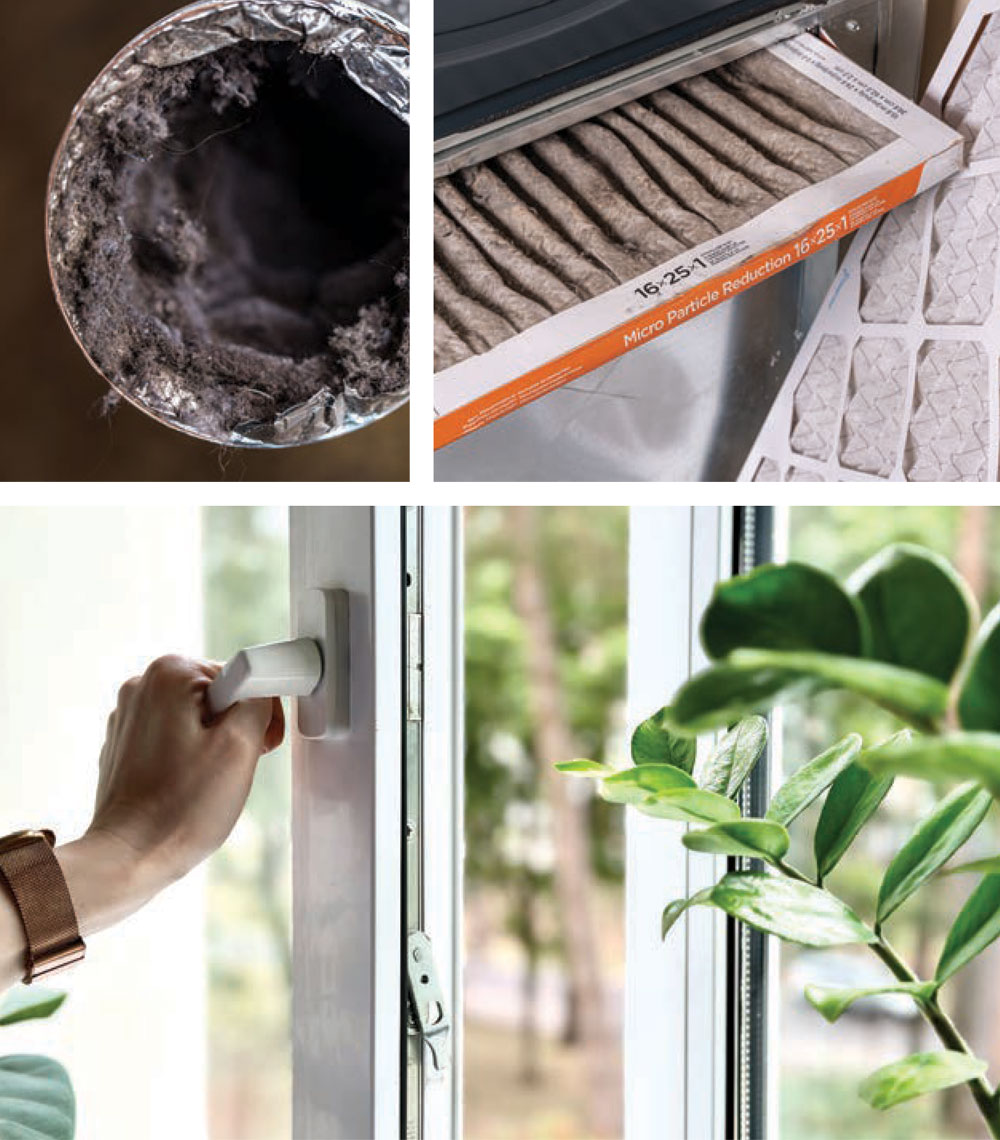BREATHE EASIER
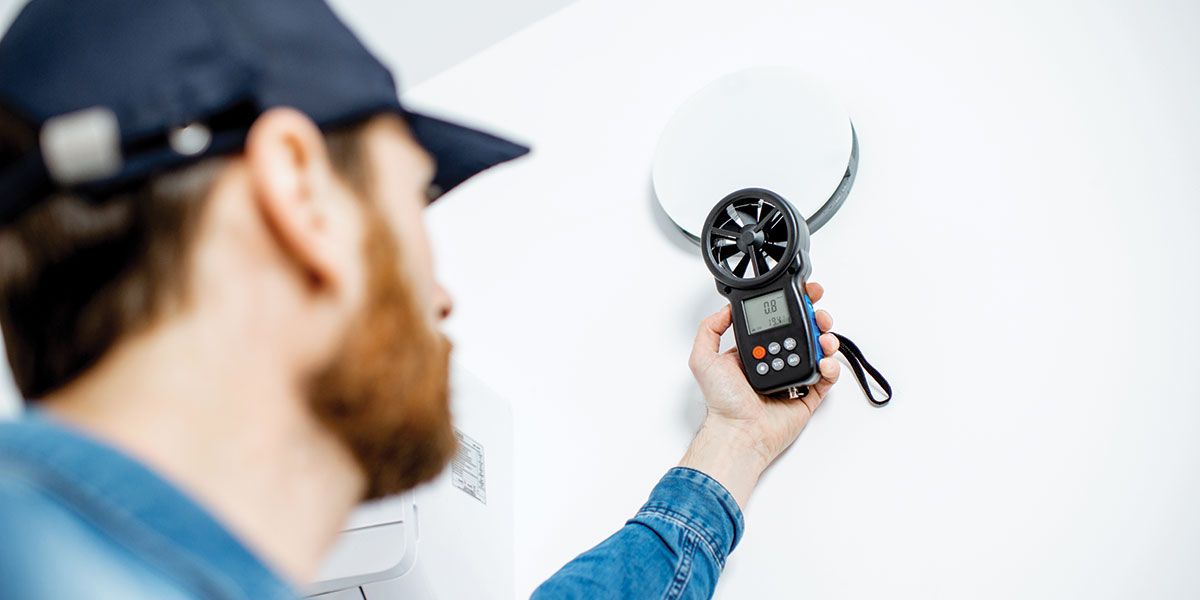
8 Steps to Better Air Quality
In the pursuit of creating a cozy and comfortable home, the air we breathe is often overlooked, yet the quality of indoor air plays a significant role in our overall well-being. The average person spends about 90 percent of their time indoors, making the quality of the air we breathe inside a critical factor in our health.
For some great tips to help you create a healthier living environment, we sought expert advice from David Moseley, president of Terrell E. Moseley, Inc., a local HVAC company. Let’s explore some annual practices and helpful tips that can contribute to improving your home’s indoor air quality.
Before delving into the actionable steps, it’s essential to understand what contributes to indoor air pollution. Common culprits include dust, pet dander, mold, pollen and volatile organic compounds (VOCs) emitted by household products. Inadequate ventilation, particularly in well-sealed homes, can exacerbate the issue, leading to a range of health problems.
One effective way to improve indoor air quality and create a more comfortable home environment is by installing an air source heat pump. This technology not only provides efficient heating and cooling but also contributes to better air quality by minimizing the reliance on fossil fuels and reducing the amount of outdoor air pollutants that enter the home. To ensure optimal performance and integration with your existing HVAC system, it’s important to consult with air heat pump installers near me. These professionals can help you select the right system for your needs and ensure a smooth installation process, which can enhance both air quality and energy efficiency.
Poor indoor air quality can contribute to a range of health issues, including respiratory problems, allergies and fatigue. Long-term exposure to indoor pollutants has also been linked to more serious conditions such as asthma and cardiovascular diseases. Identifying signs of poor air quality is crucial for prompt intervention. According to Moseley, symptoms of poor air quality include odors, coughing, sneezing, itchy/watery eyes and headaches. If you notice any of these symptoms persisting, it’s time to investigate and improve your indoor air with these tips:
1. VENTILATION IS KEY
Proper ventilation is the foundation for good indoor air quality. In Central Virginia, where weather conditions can vary, it’s crucial to strike a balance between energy efficiency and ventilation. Regularly open windows and doors to allow fresh air to circulate, especially during moderate weather. Moseley suggests making sure to also use exhaust fans in the bathroom and kitchen to prevent odors or excessive humidity.
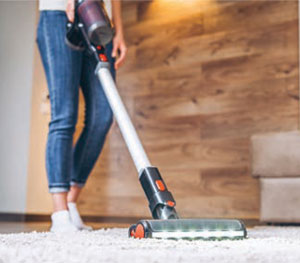 2. MAINTAIN A CLEAN ENVIRONMENT
2. MAINTAIN A CLEAN ENVIRONMENT
A clean home is a healthy home. Regular cleaning habits can significantly impact indoor air quality. Frequently dust and vacuum surfaces, carpets and upholstery. Use a vacuum cleaner equipped with a high-efficiency particulate air (HEPA) filter to capture smaller particles that traditional vacuum cleaners might miss. Don’t forget to clean or replace HVAC filters regularly, ensuring efficient air circulation and filtration.
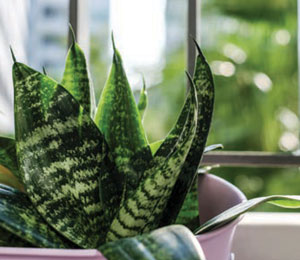 3. INTEGRATE HOUSEPLANTS
3. INTEGRATE HOUSEPLANTS
Houseplants are not just aesthetic additions to your home; they can also act as natural air purifiers. Plants like spider plants, peace lilies and snake plants are known for their ability to filter out common indoor pollutants. Embrace the lush greenery and bring it indoors for a breath of fresh air! Click here to see more on houseplants.
4. BE MINDFUL OF HOUSEHOLD PRODUCTS
Opt for low-VOC or VOC-free paints, cleaning products and building materials. Choose natural and eco-friendly alternatives when possible. This simple shift in product choices can have a significant impact on the air quality within your home.
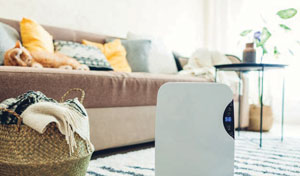 5. HUMIDITY CONTROL
5. HUMIDITY CONTROL
Central Virginia’s climate can be humid, particularly during the summer. Excess humidity can contribute to mold growth and dust mites, negatively impacting indoor air quality. Invest in a dehumidifier to maintain humidity levels between 30-50 percent. Additionally, ensure proper ventilation in areas prone to moisture, such as basements and bathrooms.
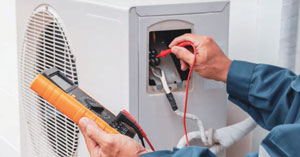 6. REGULAR HVAC MAINTENANCE
6. REGULAR HVAC MAINTENANCE
Your HVAC system plays a crucial role in maintaining indoor air quality. Schedule regular professional maintenance to ensure your system operates efficiently. This includes cleaning ducts, checking for leaks and ensuring that the system is properly calibrated. A well-maintained HVAC system not only enhances air quality but also improves energy efficiency, reducing utility costs.
For specialized needs such as a/c repair or emergency services, it’s beneficial to establish a relationship with a reliable HVAC service provider. They can offer prompt assistance in diagnosing and resolving issues, ensuring minimal disruption to comfort and air quality at home. As a part of regular HVAC maintenance, Moseley recommends seeking a professional assessment to tailor solutions for improvement. He also suggests the use of an air quality monitor — a device that can be placed in your home to record levels of particulates, carbon monoxide, VOCs and radon. While some monitors are available for personal use, Moseley recommends professional assistance if you suspect air quality issues.
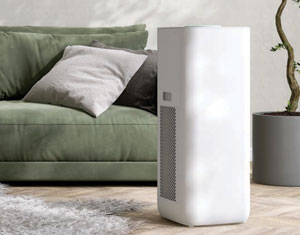 7. CONSIDER AIR PURIFIERS
7. CONSIDER AIR PURIFIERS
For an extra layer of protection, especially for those with allergies or respiratory conditions, consider using air purifiers. HEPA filters can capture small particles, including dust, pollen and pet dander. Place air purifiers in commonly used areas, such as bedrooms and living rooms, to create designated clean-air zones. When it comes to optimizing your indoor air quality, integrating the expertise of an electrician like Leolec can be invaluable. They can assess the electrical aspects of your HVAC system, ensuring it functions safely and efficiently. Leolec can inspect wiring, circuits, and connections to prevent any potential hazards or malfunctions that may compromise air quality or system performance. Additionally, they can advise on the installation of air purifiers, ensuring they are properly integrated with your electrical system for optimal functionality.
it’s also beneficial to search for an electrician near me who specializes in such installations. Local electricians bring valuable knowledge of regional electrical codes and standards, which can be crucial for the safe and efficient setup of your home’s systems. They can provide tailored advice and services, ensuring that your air purifiers are effectively integrated into your home’s electrical infrastructure.
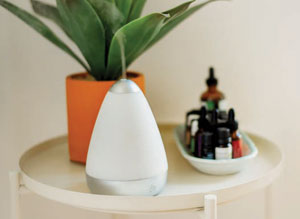 8. BE CAUTIOUS WITH HOME FRAGRANCES
8. BE CAUTIOUS WITH HOME FRAGRANCES
When it comes to home fragrance products, Moseley adopts a cautious approach and indicates that there are no home fragrances that he recommends and urges others to avoid them as much as possible. Many commercial air fresheners contain VOCs that can contribute to indoor air pollution.
Instead, consider natural alternatives such as essential oil diffusers, potpourri made from dried herbs and flowers or simply ventilating your home with fresh air. These options not only add a pleasant scent but also contribute positively to indoor air quality.
When home is synonymous with comfort, taking steps to improve indoor air quality is an investment in the health and well-being of you and your loved ones. Creating a home with superior indoor air quality involves a combination of annual practices, vigilant observation and informed decision-making. Breathe easy, friends! ✦
air purifiers, asthma, breathe, cardiovascular diseases, Dust, Fragrance, Houseplants, humidity, inadequate ventilation, indoor air pollution, indoor air quality, indoor pollutants, mold, pet dander, pollen, volatile organic compounds
